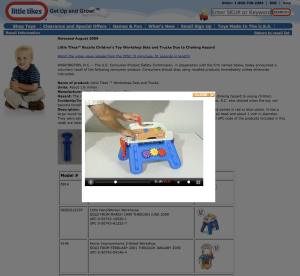Three weeks after the offshore oil rig exploded, the situation is still out of control and oil is still spilling into the waters of the Gulf. Attempts to stop, minimize or even contain the oil have so far failed, leaving many people to point the finger at Read the rest of this entry »
Posts Tagged ‘New media’
BP’s Apologia and Visual Rhetoric
In Apologetic rhetoric, New media, Rhetorical analysis, Visual rhetoric on May 10, 2010 at 11:08 amCourtney Love’s Facebook Apology
In Apologetic rhetoric, New media, Rhetorical analysis on March 23, 2010 at 11:47 amCourtney Love recently issued an apology to Billy Corgan, lead guitarist and songwriter for the Smashing Pumpkins. The apology came after Corgan bashed Love in a Rolling Stones interview.
There are three things that are interesting about this apology. First, it’s a rare case of Love actually taking the high road rather than lashing back. For fans of Love or the music industry in general, this aspect alone makes the situation noteworthy.
Second, the apology doesn’t really address any particular accusation. Instead, it addresses the entire tumultuous relationship between Love and Corgan, from their personal lives to their collaboration as musicians. Typically, we think of apologetic rhetoric as intended to address a specific accusation of wrongdoing. This perspective is derived from Halford Ross Ryan’s (1982) influential essay on the inherent connection between apologia (apology) and kategoria (accusation). As Ryan (1982) explained:
As a response to the accusation, the apology should be discussed in terms of the apologist’s motivation to respond to the accusation, his selection of the issues—for they might differ from the accuser’s issues—and the nature of the supporting materials for the apology…. Hence the critic cannot have a complete understanding of the accusation or apology without treating them both. (p. 254)
While this interplay between accusation and apologetic rhetoric is undoubtedly valuable, it is not enough in this case to analyze Love’s apology. What is needed is a deeper analysis of the context relating to Love and Corgan, as well as Love’s image with her fans.
Finally, Love’s apology is an important example of the use of new media (from websites to social networking sites) to deliver apologies. In this case, Love’s Facebook apology is especially important when we consider whom she is really addressing in her statement. Although she clearly states “Dearest Billy” at the top of the apology, we have to wonder why she chose to deliver the apology on Facebook. Is this really the way that she and Corgan communicate? Or does the use of Facebook have more to do with demonstrating to her fans the “higher road” stance that she is taking towards Corgan?
These questions get at some important research opportunities that exist in seemingly everyday apologies, especially when new media is involved as a public record or delivery mechanism. More research in these areas is definitely warranted by scholars of apologetic rhetoric and crisis management.
Joe Wilson: The Conservative Version of the Dixie Chicks?
In Apologetic rhetoric, New media, Rhetorical analysis on September 13, 2009 at 4:02 pmIf you didn’t know it before, you probably know Joe Wilson’s name now. Just a few days ago, Wilson interrupted President Obama by shouting “You lie!” during the President’s speech to a joint session of Congress.
As I’ve watched the story develop, I’ve been struck by a number of similarities between this situation and the situation faced by the Dixie Chicks a few years ago.
I understand that neither conservatives nor liberals will be happy or probably agree with such a comparison, but let’s take a second to look at what happened:
- Both spoke out against a sitting President
- Both initially tried to calm the storm with an attempt at apologizing
- Both turned from a stance of regret to defiance within days of the event
- Both ultimately relied on a strategy of “transcendence” which shifts the focus away from the particulars of a situation to larger, conceptual ideals that the audience views favorably. In doing so, they attempt to change the meaning of the event or act and transform how people understands it (Ware and Linkugel 280).
- Finally, both grounded that strategy of transcendence on the position that they are courageously speaking out against wrongs and refuse to be silenced by their enemy’s attacks
In the following paragraphs, I’ll talk about these similarities in more detail. In the end, I’ll offer a brief discussion about what such examples of apologia really mean to our larger society.
INITIAL ATTEMPT TO APOLOGIZE
Like the Dixie Chicks, Joe Wilson’s statement was immediately denounced. In Wilson’s case, politicians and media pundit from both sides of the aisle called Wilson’s outburst inappropriate, if not disrespectful and uncivil.
Also like the Dixie Chicks, Wilson was quick to offer a seemingly apologetic statement. He even posted it on his Facebook page.
Let’s look at the similarities between those initial attempts at apologizing.
Natalie Maines, lead singer of the Dixie Chicks, initially apologized for saying she was ashamed that President Bush was from Texas, stating “I feel the president is ignoring the opinion of many in the U.S. and alienating the rest of the world. My comments were made in frustration, and one of the privileges of being an American is you are free to voice your own point of view.”
Similarly, Wilson initially stated: “I let my emotions get the best of me when listening to the President’s remarks regarding the coverage of illegal immigrants in the health care bill. While I disagree with the President’s statement, my comments were inappropriate and regrettable. I extend sincere apologies to the President for this lack of civility.” Two days later, she added, “I apologize to President Bush because my remark was disrespectful.”
Although both statements indicate a belief that they feel the presidents are wrong, we see some signs of what William Benoit termed mortification, in which the accused “offers a sacrifice of self, an acceptance of wrong-doing” (Accounts, Excuses, and Apologies, p. 18).
The admittance of wrongdoing in both cases, however, focuses on the way in which the accused parties stated their opposition to the presidents—rather than admitting that the accused parties were wrong in their assessments.
FROM REGRET TO DEFIANCE
A second similarity between Wilson’s situation and the Dixie Chicks’ situation is that the initial attempts at apologizing did little to subdue the storm. As a result, both the Dixie Chicks and Wilson responded with defiant stances that attacked their accusers.
For example, in an interview with Diane Sawyer, Maines stated: “The wording I used, the way I said it, that was disrespectful. Am I sorry that I asked questions, and that I don’t just follow? No.” When questioned further by Sawyer, Maines went on to say, “I feel regret for, you know, the choice of words or the non-choice of words. Am I sorry I said that? Yes. Am I sorry I spoke out? No.”
Wilson makes a similar transition. The day after the event—in fact, the morning after issuing his apology—Wilson embedded a YouTube video on his website http://www.joewilsonforcongress.com.
In the text next to the embedded video, Wilson states, “I should not have disrespected the President during his speech. But I am not sorry for fighting back against the dangerous policies of liberal Democrats. I will not back down.”
TRANSCENDENCE
In their transitions from regret to defiance, we see elements of transcendence in both the Dixie Chicks’ and Wilson’s rhetorical strategies.
In their 1973 essay, B.L Ware and Wil A. Linkugel described transcendence as a strategy of apologia that shifts the focus away from the particulars of a situation to larger, conceptual ideals that the audience views favorably. By shifting from the specific to the abstract, the strategy of transcendence attempts to change the meaning of the event or act, to transform how the audience situates and, therefore, understands it.
For Burke, transcendence involves seeing an act not as an instance of wrongdoing or as a crime, but rather as a pursuit of a higher goal; moreover, this link not only legitimizes the pursuit—i.e., the act—but also dispels any accusation of wrongdoing related to it (Burke 187-189).
In short, the rhetorical force of transcendence is that the act is linked and legitimized by the higher-order, abstract value.
SPEAKING OUT AGAINST WRONGS, REFUSING TO BE SILENCED, NOT BACKING DOWN
The similarities between the Dixie Chicks and Wilson don’t simply end with them both turning to a strategy of transcendence. That’s because both accused parties relied on the same transcendence.
Specifically, both the Dixie Chicks and Wilson legitimize their comments against a sitting President as an act of speaking out against wrongs and as refusing to be silenced.
For example, in April 2003, Maines stated “People think this’ll scare us and shut us up and it’s gonna do the opposite.”
Additionally, Maines’ band members Emily Robison and Martie Maguire also positioned Maines’ comment as an act of speaking out against wrong. Robison stated “here we were on the brink of war, and you are unpatriotic if you dissent” and “dissent was not even an option in our country anymore and to me that’s very un-American”
Maguire defended Maines by saying: “I think she had a right to speak out, whether it was popular or not. And I’m kind of proud of the fact that she was speaking out when it wasn’t the most popular thing to do.”
Once again, the similarity is uncanny, as the text next to Wilson’s video reads:
“I’ve been under attack by the liberals for months and they’ve done everything they can to quiet my very vocal opposition to more government interference in Americans’ lives. Now, it’s gotten even worse, but I will not stop fighting against their policies that will only lead to more government interference, more spending, and higher deficits.”
Moreover, Wilson states in his YouTube video that liberals “want to silence anyone who speaks out against” them and that he “will not be muzzled.”
Finally, both the Dixie Chicks and Wilson solidify their positions by stating they will not back down.
The Dixie Chicks’ made this statement through the lyrics of their hit song Not Ready to Make Nice, in which they say “I’m not ready to back down.” Wilson, on the other hand, uses almost the exact same wording on his campaign website, stating “I will not back down.”
FINAL WORDS
In describing the specific details above, I’ve made a case that Joe Wilson’s apologia is not only similar but nearly identical to that of the Dixie Chicks just a few years ago.
As such, it is worth pointing out that the underlying foundation for these similar strategies of transcendence is the values of freedom of speech and dissent. In that sense, the final similarity—some might say, irony—between the Dixie Chicks’ apologia and Wilson’s apologia is that they both defend their actions as patriotic.
In doing so, they both challenge audiences to consider what it means to be patriotic and American today—that is, they implicitly ask whether speaking out or supporting the President is an act of patriotism and an American value.
Regardless of how individuals choose to answer when faced with this false dichotomy, it’s worth pointing out to staunch Republicans that Wilson is employing the same rhetorical strategy and argument that conservatives denounced the Dixie Chicks for using. Additionally, to today’s Democratic supporters of President Obama it must be noted that the same values many of them applauded the Dixie Chicks for upholding are now being argued by the man across the aisle.
Perhaps somewhere in there, there is room for compromise and agreement.
Toy Recall – Little Tikes Uses New Media and Social Networking to Disseminate Safety Information
In New media, Product recall on August 13, 2009 at 9:09 amLittle Tikes has recalled its toy workshop sets and trucks due plastic toy nails that can pose a choking hazard to young children. To remedy the situation, the company states that “consumers should immediately take the toy nails away from young children and contact the firm for instructions on obtaining a free replacement toy nail.”

To disseminate the recall information, Little Tikes provides a variety recall and safety information on its corporate website as well as the Little Tikes Twitter, Facebook, and MySpace accounts–including background information about the safety hazard, images and product specs for quick identification of products included in the recall, and even a video. Read the rest of this entry »
Big Muddy Makes Recall Info Prominent
In New media, Product recall on July 1, 2009 at 9:33 amBig Muddy recently recalled about 450 generators sold in Illinois and Missouri during May 2009. To help spread the word about the product recall, the company prominently displayed a recall notice and link on the main page of its website. Looking at the Consumer Product Safety Commission’s Web Site Notification Guidelines, we see that Big Muddy provides an exemplary model for the first guideline… Read the rest of this entry »
Nestle’s Online Recall of Toll House Cookie Dough
In Apologetic rhetoric, New media, Product recall on June 19, 2009 at 1:56 pmThis video is part of my new series to help spread the word about product recalls and examine how companies shape the delivery of recall information by using the internet and social networking sites.
In this edition, we look at the Nestle Toll House Cooke Dough recall. To view the websites discussed in this video, click on the links below.
Nestle Baking Products Website
FDA Recall of Nestle Toll House Cookie Dough
FDA Position on Use of Electronic Communication
Consumer Product Safety Commission Web Site Notification Guidelines
Zicam’s Safety Withdrawal Language Isn’t Much of a Withdrawal
In New media, Product recall on June 17, 2009 at 10:02 amIn terms of announcing the withdrawal of Zicam, Matrixx does a very good job of making the information prominent on its Zicam website. However, a bigger issue may be what the company says, rather than how easy the information is to access.
In the paragraphs below we’ll see how the company uses a combination of denial, bolstering, and attacking the accuser in its statement. More importantly, we’ll see how those strategies may ultimately confuse consumers and lead to additional health risk.
Product Recall Widget
In Product recall on June 10, 2009 at 8:56 amAs if the FDA’s use of Twitter to deliver product recall information wasn’t enough to establish new media as the new frontier in product recall communication, the FDA is also employing a Peanut Product Recall Widget to distribute the latest information about the recent peanut/salmonella recall. And, because the FDA provides the code for the widget, Read the rest of this entry »
Bugaboo: Online Product Recall of Strollers
In Product recall on June 8, 2009 at 10:46 amRecently, Bugaboo issued a product recall of its Bugaboo Bee stroller, after it received 121 reports of brake failures. In addition to issuing a statement in cooperation with the Consumer Product Safety Commission, the company posted recall information on its website. So how does that information rate when analyzed using the CPSC’s website guidance and apologia theory as lenses for understanding and evaluation? Read the rest of this entry »
Hydroxycut: Product Recall Website = Apologia
In Product recall on June 2, 2009 at 3:19 pmAfter the FDA received 23 reports of serious liver-related injuries and advised consumers to stop taking Hydroxycut, the maker of the weight-loss supplement recalled its products.
As part of its effort to deliver this recall, both the official sites for Hydroxycut and Hydroxycut Max were redirected to a new “information site” addressed as hydroxycutinformation.com/. So what information did the company highlight on that site? Read the rest of this entry »








